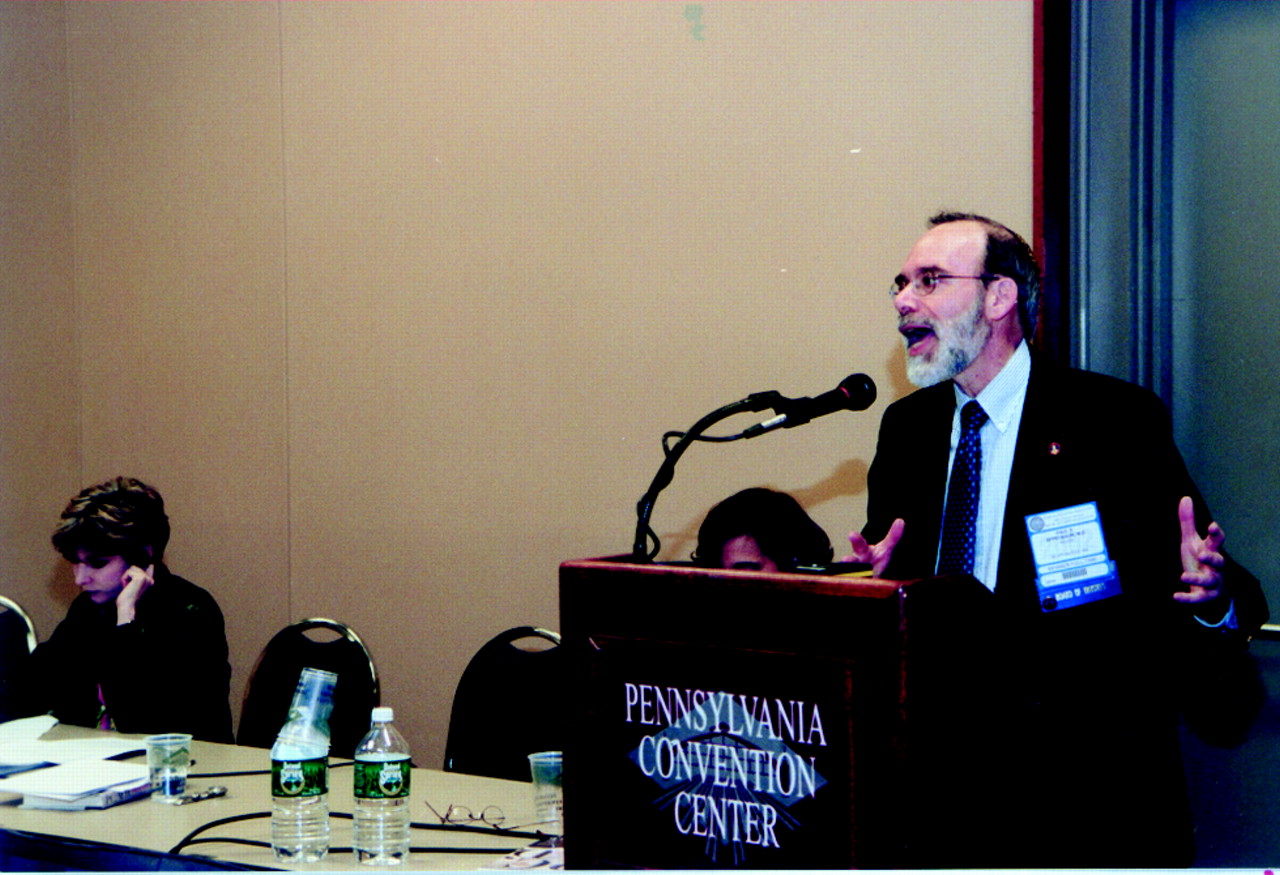Does Political Correctness Have a Place in Psychiatry?

Paul Appelbaum, M.D., discusses his definition of “political correctness” while debate opponent Sally Satel, M.D., listens.
“[Resolution of] the debate question turns on a definition of PC,” said Satel. “Like pornography, you know it when you see it.”
Appelbaum said, “How you come out on the debate depends critically on how you define PC. If we were to agree that PC means everything ridiculous that happens in medicine, there would be no disagreement between us.”
Satel, a practicing psychiatrist, is also a lecturer at the Yale University School of Medicine, a fellow at the American Enterprise Institute, and author of PC, M.D. : How Political Correctness is Corrupting Medicine.
Appelbaum, who became APA president at the conclusion of the annual meeting, is chair of the psychiatry department at the University of Massachusetts Medical School and director of its law and psychiatry program.
Satel saw PC in the submission form for annual meeting presentations used by APA’s Scientific Program Committee. The form requested submitters of each session to indicate whether the speakers were early career psychiatrists; gay, lesbian, or bisexual identified; international medical graduates; women; American Indian, Alaska native, or native Hawaiian; Asian-American/Pacific Islander; black/African American; Caucasian; Hispanic/Latino; and/or other.
“It seemed like a setup for a quota system,” she said. The response to her protest, she continued, appeared to suggest that without an effort to seek diversity, “APA would continue to receive submissions in which the majority of presenters are Caucasian males.”
Satel described the committee’s request as “a classic example of PC.” She said, “It’s obviously unfair, generates resentment, and to the extent that other presentations are omitted, it might deprive members of the best work available.”
Satel also saw PC while working as a staff psychiatrist to a drug court in the District of Columbia. She told of men who were functionally illiterate and sentenced by the court to a treatment program that contained large blocks of time in which they talked about how oppressed they felt as black men.
She claimed that such efforts and other multicultural counseling programs are based on the assumption that psychological readjustment is not possible without understanding “one’s place in the ongoing drama of the powerful and the disenfranchised.”
The larger issue, according to Satel, is that such an approach “regards patients as members of a victim group, rather than as individuals. Looking for people or institutions to blame is not healthy.”
She added, “The patients knew better.” They wanted opportunities to earn GEDs and dreamed of being in a union.
There are situations, however, replied Appelbaum, in which it makes sense to focus on a patient’s membership in a group with a history of neglect and victimization. Such focus can heighten awareness that members of the group might continue to receive inferior health care.
It can also enable individuals to perceive genuine victimization. He noted that 20 years ago battered women were asked to reflect on why they provoked hostility. Only when mental health professionals and others began to pay attention to the battering did society begin to develop remedies such as safe houses to protect women.
Sensitivity to the feelings and beliefs of people with a history of suffering discrimination also can be critical to establishing a good therapeutic relationship with a member of that group.
In fact, said Appelbaum, “Failing to recognize that a patient might see you as the agent of an oppressive society puts you completely out of the picture when it comes to understanding what’s going on in his head.”
The MacArthur Foundation funded studies that found that the perception of coercion in mental health treatment depended directly on how much voice a patient had in determining that treatment. Patients with the opportunity to present their perspectives about hospitalization reported less coercion, even if the hospitalizations were involuntary.
“Respect for the patient’s perspective leads to better outcomes,” said Appelbaum. Insensitivity leaves the psychiatrist lost, wondering why the patient won’t take medication or keep appointments.
He observed that “good research depends on cultural sensitivity.” And it’s good research that will lead to appropriate and more effective treatment. In a study exploring hallucinations, for example, members of Hispanic groups reported seeing visions of dead relatives. Without understanding that such visions were common in the culture, researchers might have concluded that the research subjects were psychotic.
Appelbaum said that a number of people found the annual meeting submission form offensive and that the Board of Trustees voted to make answering it optional for future meetings. But, he argued, diversity has advantages. “To understand my patients, I need to hear from people who have experiences similar to theirs.”
In her rebuttal, Satel offered a definition of PC as “orthodoxy intended to maintain victim status when the data do not support such status.”
She agreed that “sensitivity is key.” “That’s not cultural competence,” she said. “That’s competence.”
Satel also told the audience that she had recently been nominated to serve on the national advisory council to the Center for Mental Health Services (CMHS) and that she is opposed to the agency’s funding of programs in support of the consumer/survivor movement.
“I’m not in favor of supporting some of the more radical elements of the consumer/survivor movement who are overtly against medication. . . . I’m against people who will block all efforts at expanding outpatient commitment. They should have their voice, too, but I don’t particularly think I’ll pay attention.” ▪



